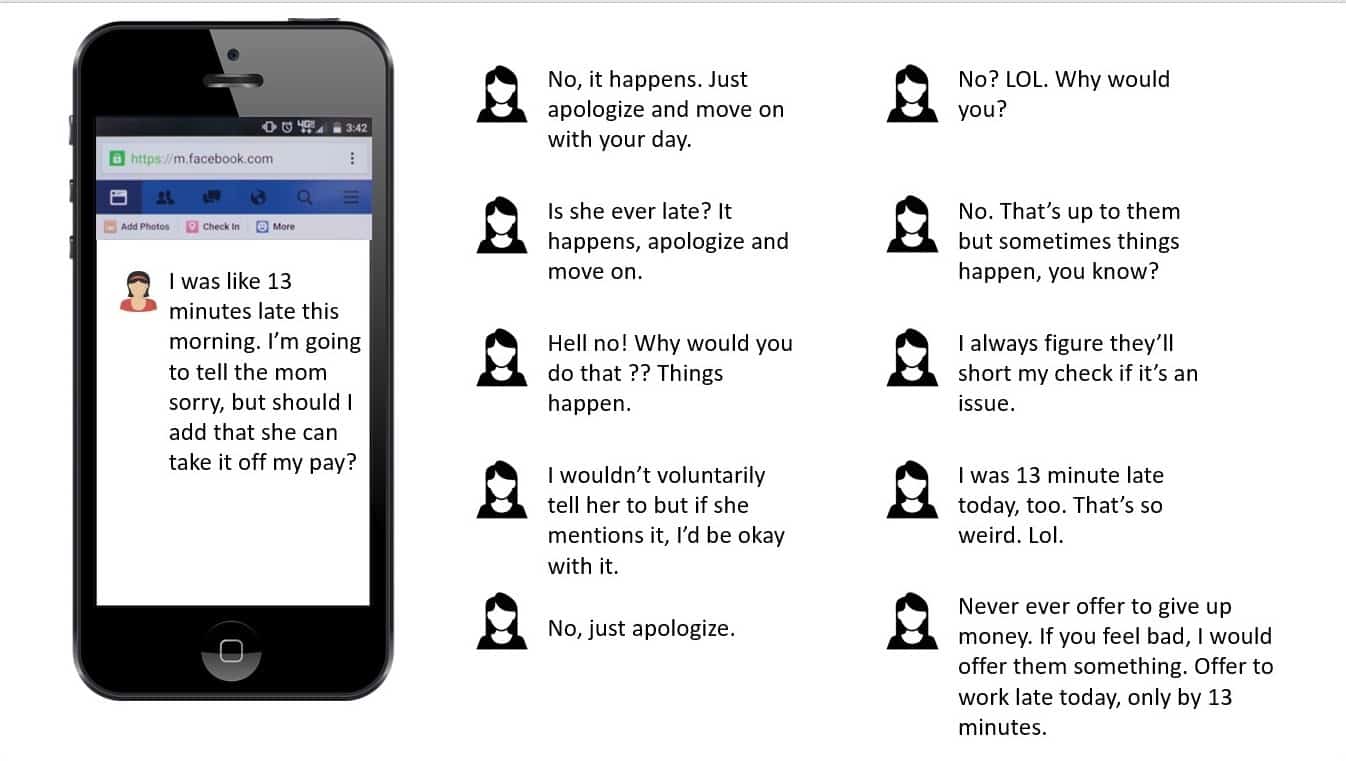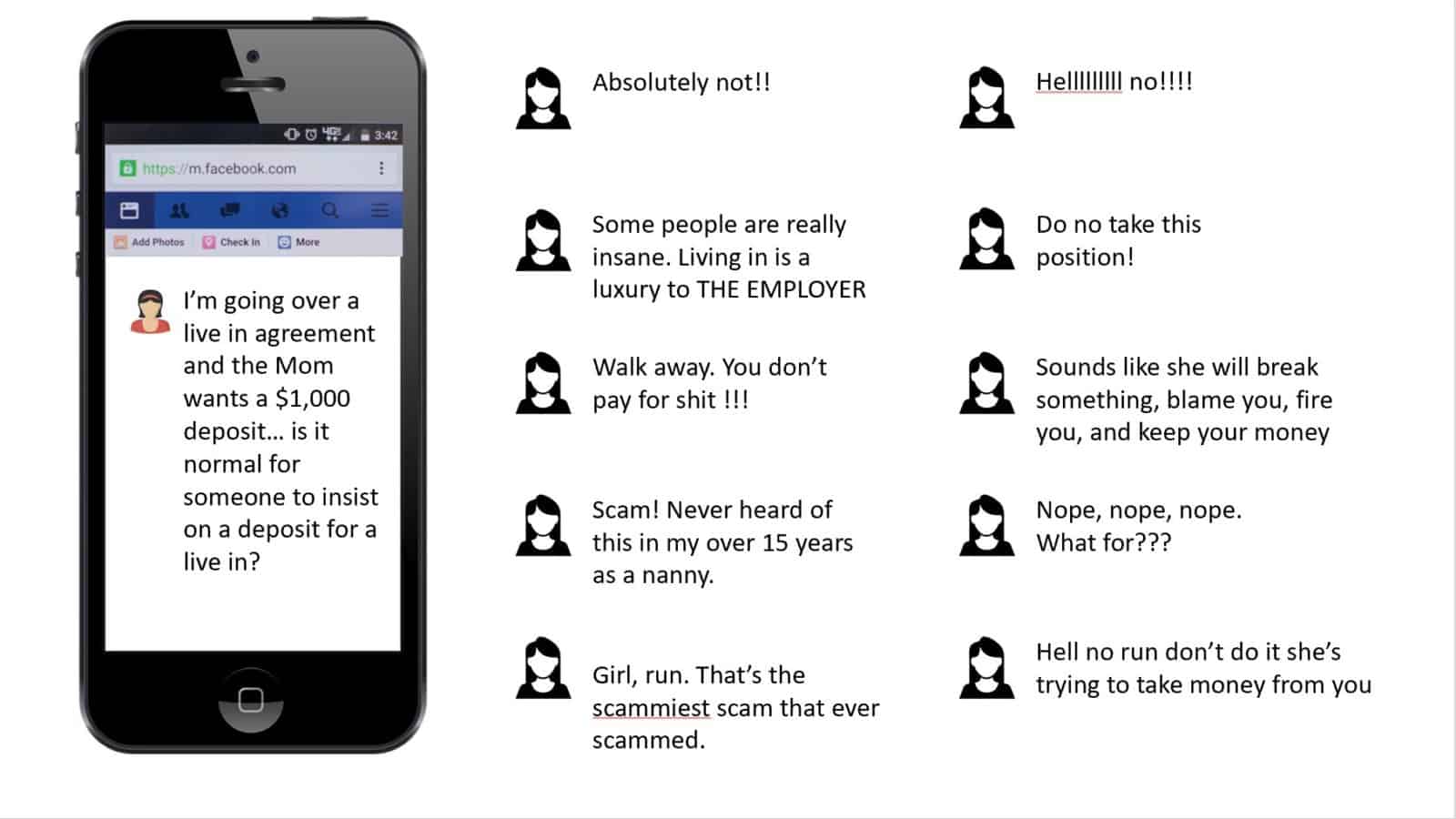Social media is a great place to learn more about a lot of things, including tips about being a Nanny or Sitter but it’s important to remember that social media is not private. Engaging online is convenient and a lot of wonderful Nannies share great tips, advice, and recommendations. However, not everything on social media is useful and some comments can impact your reputation and career. From recommendations to quit a job or stick it out, you have to consider the information you share, the information you see and determine what is right for you.
A common post focuses on Sitter and Nannies wages. Many nannies seek jobs paying $15-20 an hour while sitters earn about $10 an hour. Confusion about job titles and differing expectations leads to conflicting advice. Sitters supervise children, often for a few hours while parents are away. Sitters should have CPR and First aid training. Some families are seeking a sitter as an affordable childcare option.
Nannies have invested in training and provide childcare with advanced, developmentally appropriate activities incorporating STEM, music and art while using proven techniques like positive discipline to guide child behavior. The difference between a Sitter and a nanny is not just work experience, but whether the nanny has invested in collegiate level childcare training and nanny certification. Education and experience are required to earn higher than average wages with families seeking a childcare professional.
Let’s examine 2 actual social media conversations and their most popular responses.
The posts have been re-created to protect the privacy of the participants, but the comments are genuine. For this article, only the comments that centered around the questionable advice are included. The posts had other responses that are not included here.

Nannies should be treated with respect by all employers, but nannies also have an obligation to behave professionally. Whether an office position, working in retail or employed at a restaurant, it’s expected that employees show up on time and successfully complete the tasks of the job. In general, if an hourly employee is late, they are not paid for time they did not work.
Families and nannies count on each other so having a trusting and reliable working relationship with good communication is important. Showing up late can make a family wonder if the nanny can effectively manage her schedule or if the job is important to the nanny. Even if the family doesn’t say anything, the family is forced to adapt to the nanny’s tardiness.
Let’s be honest, for every rule, there is an exception. Some families and nannies are good matches when they both run late and have a flexible view of time. However, this is less common as the majority culture in the United States is time-sensitive. To be late to a meeting or appointment implies you put a higher value on your time by making the other person wait. Many employers will get quickly frustrated waiting for an employee.
Let’s consider this scenario from the family’s viewpoint. Here is a post that could have been written by the mom in a mommy Facebook group: For the second time in 2 weeks, our nanny has been late to work. I know things come up, but we have always made sure we were home on time to respect her time off. Do I have to tell her, or can I just deduct her pay for the time she missed? It was only 15 minutes and she apologized, but I’m not sure I can count on her. She works two days a week and I’m wondering, should I be looking for a new nanny?
Now let’s look at another conversation.

It’s important to protect yourself as a nanny and be aware of the laws and norms of working for a private employer. As every family-employer and nanny job is different, it’s also important to take time to understand and ask questions about job responsibilities or terms that are new or not clear.
Family employers likely work outside of the home and bring their professional experiences with them as they seek to hire a nanny. Employees working for a company are often required to sign non-disclosure or confidentiality agreements and these are becoming increasingly common in the childcare industry. Similarly, working outside the home, employees are under camera surveillance so having cameras in the home is also becoming commonplace.
If the family works in the housing industry, they are used to refundable deposits being required for all persons who rent an apartment, lease a house and even vacation in some Airbnb rentals. In this post, the nanny shared that the family employer was asking for a $1,000 refundable deposit to provide the family-employer with some protection if the live-in nanny damages the property. The original poster also shared that if the Nanny was not able to provide the $1,000 refundable deposit, a guarantor would be acceptable. Guarantors are also a common practice in the housing industry for renters with limited or inadequate credit history.
It’s important to note that live-in nannies are not renters, but domestic employees. Standard business practices used in the housing industry do not apply to domestic employees. However, families can take appropriate measures to protect their property. Likewise, live-in nannies should consider getting renters insurance to protect their personal property.
Every position as a Nanny who works for a family employer is unique and it’s up to the nanny and family to communicate well and work together. When seeking advice, social media can provide a lot of great information but be wary. Only you can make the right decisions for your situation and goals.

Recent Comments